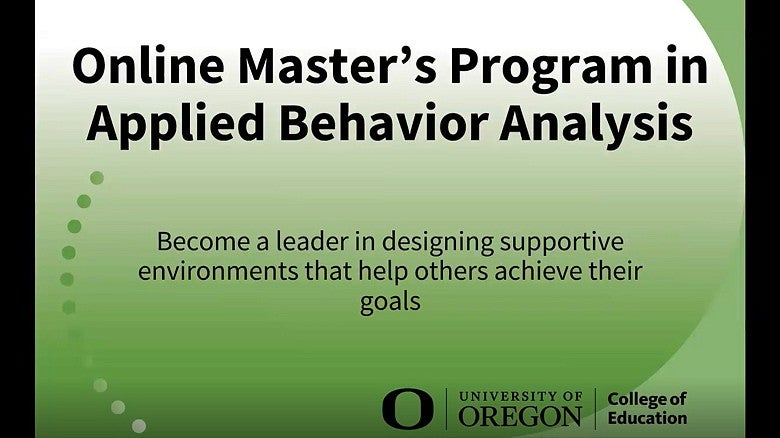Program Objectives | Info Session | What Our Students Are Saying | Faculty Spotlight | Commitment to Inclusion and Social Change | BACB Exam Eligibility | Outcomes
About the Applied Behavior Analysis Program
The mission of the Applied Behavior Analysis Program at the University of Oregon is to develop culturally responsive and compassionate clinician-researchers in the science of human behavior and learning through a strong foundation in the principles and conceptual underpinnings of ABA and programming that is empirically supported and continuously evaluated for quality improvements. Further, we strive to improve diversity in the field of applied behavior analysis by preparing future behavior analysts to serve racially and ethnically minoritized populations and preparing clinicians whose backgrounds are underrepresented in the field.
The University of Oregon Online Master of Science in Applied Behavior Analysis (ABA) is designed to:
- Prepare clinician-researchers to apply the science of human behavior and learning to a variety of populations and settings
- Provide a strong foundation in the principles and conceptual underpinnings of ABA and the application of behavior analysis in multidisciplinary contexts
- Give students opportunities to gain supervised research experience in behavior analysis
Our fully online program includes:
- Both synchronous and asynchronous learning activities each week
- An inter-teaching framework, which allows the faculty to develop instruction that is responsive to students’ needs
- A cohort model, in which students work through their courses together, allowing them to develop a support system and strong relationships with each other and the program faculty
- A cohort model, in which students start together in the fall and work through their courses together, allowing them to develop a support system and strong relationships with each other and the program faculty
Take me to the program objectives


Core program faculty include Kimberly Marshall, PhD, BCBA-D, David Cosottile, PhD, BCBA-D, and Lindsay Feltis, PhD, BCBA-D. Dr. Wendy Machalicek, PhD, BCBA-D is an associated program faculty, who also advises students. We have other faculty contributors who support our program’s continual improvement and provide research opportunities for interested students. We also have additional affiliate faculty for research supervision. Please contact Kimberly Marshall, PhD, BCBA-D for more information.
What can I do with this degree?
If you are interested in designing supportive environments that help others achieve their goals, you may be interested in studying behavior analysis. Special educators, psychologists, behavior assistants, educational assistants, and others looking for a career change can all benefit from becoming certified as a behavior analyst.
Behavior analysts can work in a variety of settings and with a variety of populations.
- Work as a behavior analyst in schools or clinics
- Support autistics/individuals diagnosed with autism or individuals with intellectual and developmental disabilities
- Improve health, fitness, and sports performance
- Enhance quality of life and care services for seniors
- Prevent and treat substance abuse disorders
- Improve sustainability practices
- Create systems level change in community and business settings
To learn more about subspecialty areas, check out the Behavior Analyst Certification Board’s Subspecialty Resources.


Transfer Credit Policy
Up to 15 graduate credits earned may be transferred and counted toward your master’s degree program. You may also use credits that were “reserved” for graduate credit while an undergraduate at the University of Oregon as part of the transfer credits. These courses must be relevant to the degree program as a whole; have earned grades of A+, A, A-, B+, B, B-, or Pass; and be courses that have not been used to satisfy the requirements for another degree. These courses must be approved by the department and by the Graduate School and may not be used to meet the requirement of 24 graded credits in University of Oregon graduate courses. Transferred credits are not used in computing UO cumulative grade point average. Further information and the Transfer of Credit Request form can be found by clicking the button below. The Transfer of Credit Request form must be turned in to the Graduate School the term before a student plans to graduate. The Graduate School allows master’s degree students up to seven years to complete this program. However, if a student elects to transfer credits earned prior to admission, the seven-year timeline begins on the date of the first transferred course.
Clicking on the button below will bring you to a new web page. Click on your browser's back button to return to this page.
Information Session
The next virtual information session is scheduled for Thursday, April 30, 2026, from 5:00 p.m. – 6:00 p.m. (PT). Sign-up here if you are interested in attending, and we will send out a zoom link a few days before the session.
Didn’t get a chance to attend our last information session? That’s okay, we’ve got you covered! Watch the recorded information session from October 23, 2025 to learn more about our program and admissions.
Clicking on the image or button below will open a new browser window. Use your browser's back button to return to this page.

Take me to the recorded session!
Take the Next Step
We’re here to answer your questions about how the applied behavior analysis program can grow your future.
Hands-On Experience
As many of the specific program task items include both knowledge targets and practice-related competencies, supervised experiences are integral to learning and mastering the content. Students in the Online Master's in Applied Behavior Analysis will complete supervised field experience guided by professors and clinicians in the field of applied behavior analysis.

To ensure that students have high quality field experiences, students’ sites will need approval from the UO ABA program. UO has partnered with the Behavioral Health Center for Excellence (BHCOE) to increase students’ access to quality practice sites. The UO ABA program will automatically approve practice sites that have BHCOE accreditation.
Students will need to have their practice sites approved by the end of their first year in the program. If students do not have an identified practice site coming into the program, program faculty can support them with identification of potential high-quality sites that align with their needs and interests. Students in the Eugene, OR area have the opportunity to complete their supervised field experience at the Center for Autism and Behavioral Supports at the HEDCO Clinic at the University of Oregon.
Research to Practice
The University of Oregon College of Education provides a rich research environment with 16 research and outreach units including Early Childhood CARES and the HEDCO Clinic.
Students in the ABA program are required to complete a thesis or thesis-equivalent research project. This project may take place at one of the research and outreach units, or may be completed within the program. All student research projects are supervised by a core faculty member. Research projects are an opportunity for students to develop, implement, and write up a research project about a topic that they are passionate about.
Faculty Spotlight, Kimberly Marshall, PhD, BCBA-D
Kimberly Marshall is a doctoral-level board-certified behavior analyst and the Applied Behavior Analysis Program Coordinator and Lecturer. Kimberly has extensive experience in program development and consultation for public school programs, and previously worked as a general education and special education teacher. She has presented nationally and internationally on topics including functional analysis, reading comprehension, and conceptual instruction in applied behavior analysis.
Commitment to Inclusion and Social Change
The Online Applied Behavior Analysis program is committed to the preparation of behavior analytic professionals who reflect the multicultural context of the United States. We strongly encourage applications from potential students who identify as Black, Indigenous, or a Person of Color (BIPOC) as well as from potential students who are neurodiverse, have a disability, or are LGBTQ+.
Additionally, the Master’s degree in Applied Behavior Analysis requires students to meet programmatic requirements related to diversity, equity, justice, and inclusion. These requirements will prepare students to be behavior analytic professionals who engage in reflective practices, cultural humility, neurodiversity affirming practices, advocacy for improving disparities in applied behavior analysis, and cross cultural applications of applied behavior analysis (e.g., with clients from different racial/ethnic backgrounds, linguistic and religious backgrounds, and gender and sexual orientation minorities, as well as neurodivergent persons and individuals with disabilities). Diversity, equity, justice, and inclusion competencies are embedded throughout the online coursework and in online professional colloquia to ensure access to neurodiversity affirming practices and the development of cultural responsiveness in the practice of applied behavior analysis.
Resources for Historically Excluded and Underrepresented Students and Allies
Contemporary Values of Behavior Analysis
Please review the following resources that exemplify the contemporary values of behavior analysts including ethical and effective behavior change and position statements against conversion therapy and practices, restraint and seclusion and the use of electric shock in treatment of individuals with disabilities. These practices do not align with the Behavior Analysts Code of Ethics (BACB, 2022).
Position Statement on Conversion Therapy and Practices
Campau, S., Capell, S., Conine, D. Johnson, K., Oda, F., & Pilgrim, C. (2022). Statement on conversion therapy and practices, 2022. Association for Behavior Analysis International.
Position Statement on Right to Effective Behavioral Treatment
Van Houten, R., Axelrod, S., Bailey, J. S., Favell, J. E., Foxx, R. M., Iwata, B. A., & Lovaas, O. I. (1989). Statement on the right to effective behavioral treatment, 1989. Association for Behavior Analysis International.
Position Statement on Restraint and Seclusion
Association for Behavior Analysis International. (2010). Statement on restraint and seclusion, 2010.
Ethics Code for Behavior Analysts
Behavior Analyst Certification Board. (2020). Ethics code for behavior analysts.
Position Statement on the Use of CESS
Association for Behavior Analysis International. (2022). Position statement on the use of CESS.
Statement of Support for DEI
Association for Behavior Analysis International. (2025). Statement of support for diversity, equity, and inclusion (DEI) 2025.
Statement of Support for Transgender and Gender Non-Conforming Individuals
Association for Behavior Analysis International. (2025). Statement of support for transgender and gender non-conforming (TGNC) individuals 2025.
Eligibility
Our program meets the behavior-analytic coursework requirements for those pursuing the BCBA pathway 2 eligibility route. For more information on this route, please see the BCBA Handbook from the Behavior Analyst Certification Board.
If you have questions about eligibility and how this might impact you, please contact uoaba@uoregon.edu.
Outcomes Information
Title | 2025 | 2024 | 2023 | 2022 |
|---|---|---|---|---|
Number of students whose degrees were conferred by the program | 16 | 6 | 3 | N/A |
Median years until graduation for students whose degrees were conferred by the program | 1.5 | 1.5 | 1 | N/A |
Number of students enrolled in the program on January 1 of the reporting year | 31 | 18 | 6 | N/A |
Number of students no longer enrolled for any reason other than conferral of degree | 8 | 2 | 0 | 2 |
Number of completed applications received | 71 | 38 | 20 | 10 |
Number of students admitted during the reporting year | 41 | 21 | 15 | 8 |
Number of Core Program Faculty Members | 3 | 2 | 2 | 2 |
Number of Associated Program Faculty Members | 1 | 1 | 1 | 1 |
Number of Other Contributors | 3 | 4 | 4 | 5 |
Number of first-time candidates sitting for their Board Certified Behavior Analysis (BCBA) examination | N/A* | N/A* | N/A | N/A |
Number of graduates obtaining a master-level state license as a behavior analyst | N/A | N/A | N/A | N/A |
Percentage of first-time candidates passing the BCaBA certification examination | N/A | N/A | N/A | N/A |
Number of graduates obtaining a bachelor-level state license as an behavior analysis | N/A | N/A | N/A | N/A |
Median undergraduate grade point average (GPA) for applicants admitted (report on a 4-point scale) | 3.47 | 3.40 | 3.51 | 3.23 |
*Official pass rates from the BACB are not provided to programs with less than 6 first-time test takers in a year.


